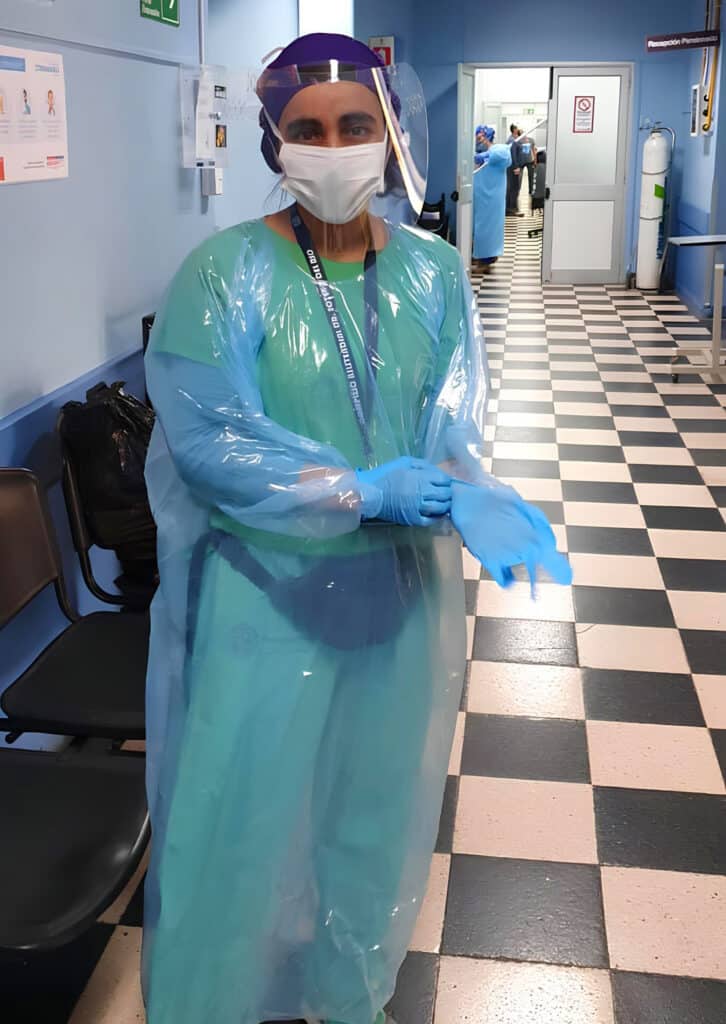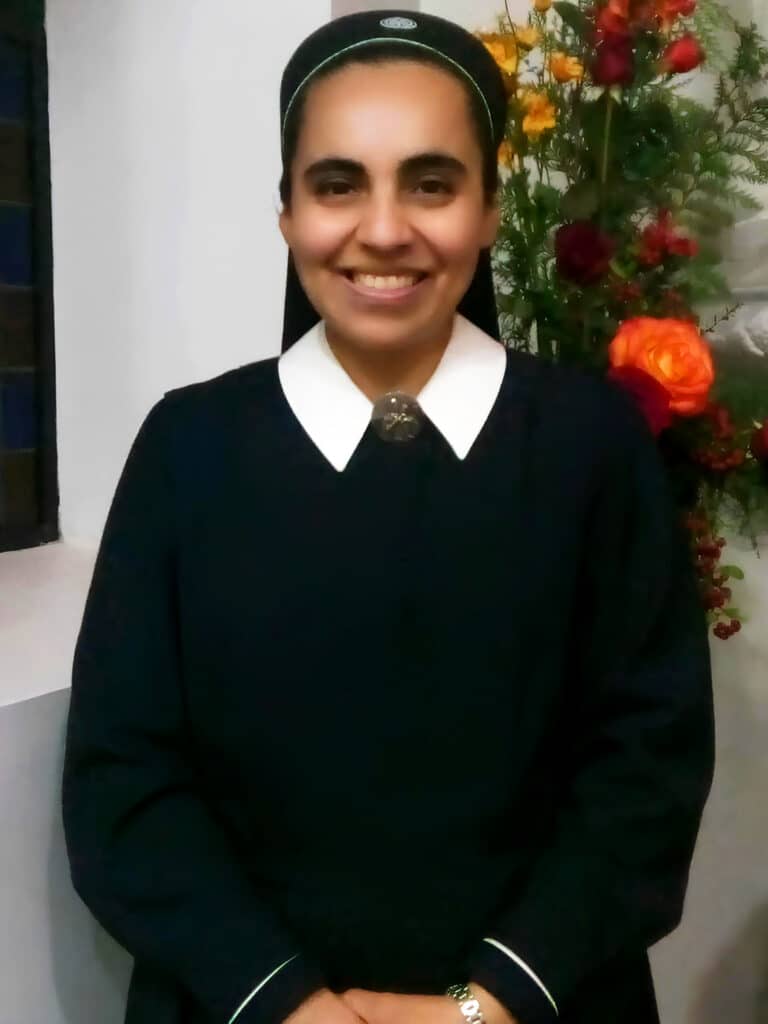In this year, Pope Francis dedicated his message for the World Day of the Sick (February 11) to a very special topic for the Schoenstatt Family: attachments. Just as we celebrate the 75th anniversary on May 31st, the Pope invites us to “Healing the Sick by Healing Relationships” – read the full message here.
Sister M. Teresa Olivares, of the Secular Institute of the Schoenstatt Sisters of Mary, is a physician specializing in palliative care. She works in a public hospital in Santiago de Chile, from where she comments on the Pope’s message in an interview.
Sister, from your point of view, what does it mean to care for the sick through the Covenant of Love? In other words, how does this bond with the Blessed Mother influence patient care?
I believe that caring for people through the Covenant of Love, in reality, encompasses the whole term “caring” itself. For me it is, in the first place, about being able to look at the person through Mary’s eyes. I still remember something when I was studying medicine: there is a moment, of course, when all suffering is very challenging; it makes you wonder about many things. There is also the question: where is God amid all this suffering? I also remember that, in a process of being able to look at what it all meant, I realized that God is in each one of us caring for those who suffer, not only for doctors and health professionals, but for all those who are witnesses, so to speak, to the suffering or pain of the other.
Obviously, Christianity has at its center the care of the most vulnerable and the sick. But I believe that Schoenstatt has as its charism, and at its core, looking at all this suffering with Mary’s eyes and heart. That is a different way of looking, it is not better or worse than others, it is simply a different way of looking at it. And that makes a tremendous difference in practical life.
Through that look – which absolutely also applies to [professional] men – we can seek tactfulness, dignity. For example, when uncovering the patient to examine him; determining whether or not it is necessary to uncover him, in cleaning the patient’s environment…. Of course, all this applies in the more technical areas as well, that is to say, it is also not just a matter of devoting oneself to these little things and forgetting the reason for being there, which is to implement a treatment, to make a diagnosis. These things, which seem like details, for someone who looks through Mary’s eyes, are not details at all.
Also worrying not only about the patient’s physical environment, but also about the family, the loved ones, about the social, psychological, and spiritual aspects. It is a way of looking at [the patient] and looking at suffering through Mary’s eyes.
And, finally, that look at suffering through Mary’s eyes is also that faithful manner of standing at the foot of the Lord’s cross, never falling into despair, into absolute pessimism, or into the most terrible nihilism, because it always knows that the Father holds the arms of the cross of his son.
In other words, to have Mary’s faith, Mary’s heart, Mary’s eyes, Mary’s hands… that is what we are when we are in front of the other.

What would you say to those who are going through an illness and to the people who accompany the sick?
I would tell them, first of all, that this is not a punishment, that we should not look for something like “I did wrong in my life so this happened to me”. I know that at first one always asks oneself: why is this pain happening to me? Why is this suffering happening to me? What did I do to deserve this? Many questions arise, such as: I took such good care of myself, why did this happen? That I believe, and also from a psychological point of view, does not help much. It doesn’t help us to grow and it doesn’t help us to cope.
I believe that these two things can help:
– In the first place, this faithful belief in a God who is good, who does not want my affliction, who is not punishing me, but who is actually sustaining me. I think this is one of the first things.
– And, secondly, to understand that an illness, a suffering, always implies a process, a process that is slow, that is not going to happen overnight, but that involves gradual advancement and growth while discovering why things happen.
I was talking to a patient who had a very difficult condition, which compromised her entire intestine, from the mouth to the bottom, and she will never be able to eat again, she will always have to be fed either through a tube directly into the intestine or through intravenous nourishment. And I had to work through a whole process with respect to that. And we started like this: this is it, this is your suffering, you will not be able to eat again, the things that you liked nor those you did not like so much, it’s like being in mourning, it’s something that has to be done. On the other hand, we have also talked and we are doing everything we can so that she can be fed through other means and continue being nourished. So, the question is, why are we going to do this? There is so much that cannot be done, but there is so much that can be done, so much still to be done for others and so many things that open up in situations like this as well.

This year, when we celebrate the 75th anniversary of the “31st of May”, Pope Francis’ message for the World Day of the Sick speaks precisely of attachments. He asks us to care of relationships and writes: “To care for the sick thus means above all to care for their relationships, all of them: with God, with others – family members, friends, healthcare workers – , with creation and with themselves”. How do you see this message and what motivation does it bring to the Schoenstatt Family?
One of the most relevant attachments is indeed the attachment to people. And what we celebrate on this May 31st are people as mediators, those who, in the first place, lead us to God, those who allow us to love God with our fully human heart. This is one of the first things and, in this sense, both the sick and those who care for them can feel as that mediator and as that bridge to the heart of God. I, as a vulnerable sick person who requires the care of others, am a bridge so that those who care for me can reach the heart of God – and this is probably my most important task. My care, my vulnerability, my suffering, all this can be a way for others to reach the heart of God and to love God with all their heart. And this involves a lot of humility, I’m not saying it’s easy.
I like to think of the world of attachments as a network. We need links with creation, with nature, with people, with things, with ideas, with work… All those links and all those relationships that are relevant to us become a network that offers support to our most authentic, truest self, that which is light in us, that which gives us life and gives life to others. Therefore, we must strengthen all these attachments, in all senses, the way we do in Schoenstatt. And with the warmth of our heart, we also know how to forego, because this is also part of the strengthening of our attachments.
Everything concerning education in human relations and relations with all the things that have been created, strengthens this network that sustains who we are. This is clearly very current, not only in a general way, in relationships with the sick, but in Schoenstatt there is a transcendence and a depth that is rooted in the Covenant of Love and in the Shrine.
For more information about the May 31st Jubilee, click here.
